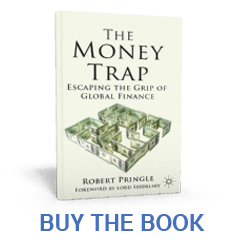Does the ‘reserve’ dollar harm America?
The flawed international monetary system is to blame for the crisis
For many years Lewis E. Lehrman and John D. Mueller have been calling attention to what they call the “reserve-currency curse.” Since some politicians and economists have recently insisted that the dollar’s official role as the world’s reserve currency is instead a great blessing, it is welcome that they have recently revisited the issue (see Wall Street Journal,November 20). They argue, on the contrary, that it harms America and the world.
They trace the problem to the 1922 Genoa conference, which was intended to supervise Europe’s post-World War I financial reconstruction, and recommended “some means of economizing the use of gold by maintaining reserves in the form of foreign balances”—initially pound-sterling and dollar IOUs. This established the interwar “gold exchange standard.”
A decade later Jacques Rueff explained the result of this profound change from the classical gold standard. When a foreign monetary authority accepts claims denominated in dollars to settle its balance-of-payments deficits instead of gold, purchasing power “has simply been duplicated.” If the Banque de France counts among its reserves dollar claims (and not just gold and French francs)—for example a Banque de France deposit in a New York bank—this increases the money supply in France but without reducing the money supply of the U.S. So both countries can use these dollar assets to grant credit.
Demand duplication
Lehrman and Mueller call that the gold-exchange standard’s “demand-duplicating feature”, based on the dollar’s reserve-currency role. It was, they say, again enshrined in the 1944 Bretton Woods agreement.
What ensued was an unprecedented expansion of official dollar reserves, and the consumer price level in the U.S. and elsewhere roughly doubled. Foreign governments holding dollars increasingly demanded gold before the U.S. finally suspended gold payments in 1971.
This is also very similar to the kind of analysis that I heard Professor Robert Triffin give in passionate terms at IMF meetings in the mid 1970s. He was in despair at the explosion of dollar reserves which, he used to say, “have increased more in the past few years than in the whole history of mankind”.
The great critics of Bretton Woods – Triffin and Rueff – actually agreed on the diagnosis. So Lehrman and Mueller stand foursquare in a great tradition.
They bring the story up to date by applying the same approach to the economic crisis of 2008-09. This time, foreign monetary authorities had purchased trillions of dollars in U.S. public debt, including nearly $1 trillion in mortgage-backed securities issued by government-sponsored enterprises. The foreign holdings of dollars were promptly returned to the dollar market, an example of demand duplication. This helped fuel a boom-and-bust in foreign markets, commodities and U.S. housing prices.
The dollar’s “exorbitant privilege” not only enables the U.S. to finance government deficit spending more cheaply, but also results in an erosion of the U.S.international investment position—i.e., government deficit-financing through the dollar’s official reserve-currency role.
Ending the dollar’s reserve-currency role would, they say, limit deficit financing, increase net national savings and release resources to U.S. companies and their employees in order to remain competitive with the rest of the world.
Trenchant analysis
One can debate their proposed solution – a return to gold – and I intend to do so in future columns but the analysis they offer can be – and deserves to be – assessed independently. In my view, it is trenchant.
How refreshing to have two economists willing to pick up the baton from the likes of Rueff and Triffin – not to mention Keynes himself – and insist on the connection between the flawed international monetary system and domestic economic problems. Is anybody listening?
Messrs. Lehrman and Mueller are principals of LBMC LLC, an economic and financial market consulting firm. Mr. Lehrman is the author of “The True Gold Standard: A Monetary Reform Plan Without Official Reserve Currencies” (TLI Books, 2012). Mr. Mueller is the author of “Redeeming Economics: Rediscovering the Missing Element” (ISI Books, 2014).

